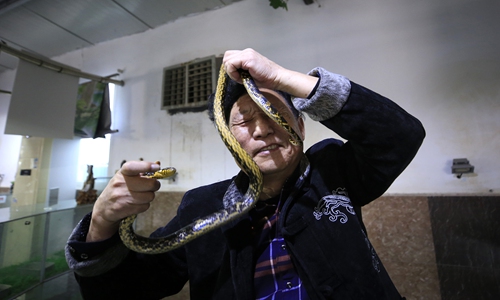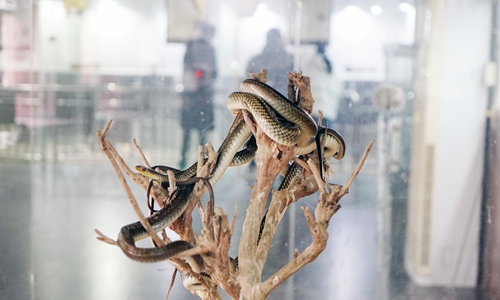Dangerous reptiles bring thriving businesses to a Chinese village
The charms of snake farming

Yang Hongchang wraps a snake on him.
Snakes can bite. Snakes can kill. But snakes can be friends with human too. This friendship is part of the economic and cultural fabric of Zisiqiao, a tiny village in East China's Zhejiang Province, which has been telling a story of "Farmers and Snakes" for four decades. People in Zisiqiao insist that "all parts of a snake are treasures."
Zisiqiao is nicknamed as China's "No.1 Snake Village" with celebrity resident Yang Hongchang dubbed China's "snake king."
Slither of hope
This story dates back to the 1970s when the then 18-year-old Yang Hongchang contracted a spinal mobility disease that cost all his family's limited wealth.
The disease broke his body and medical treatment Yang sought had failed to control his ailing condition. A traditional Chinese medicine doctor in Shanghai suggested that Yang try snake liquor as there were snakes in the mountainous area of Deqing where Zisiqiao is located.
Yang caught snakes to make snake liquor.
"Amazingly, the spinal infection was finally under control without worsening further," Yang told the Global Times. "Inspired by my own experience, I think snakes can also help cure disease for other people."
He soon started selling snake liquor and snake pills to earn some money.
"The wild snakes couldn't meet the ever increasing market demand when China began its reform and open-up. In traditional Chinese medicine, snakes are recognized for the medicinal properties and are commonly prepared in nutrition soup or drunk as liquor to boost people's immune system. It occurred to me that I could domesticate snakes," said Yang, who became the first snake farmer in the village.
Yang believed the medical attributes of venom, gall bladder, liver and skin from snakes would make him a fortune, but the road to the throne as the"snake king in China" was not a smooth path of slithering.
"In the first year of 1982, just 10 percent of the snake eggs I purchased hatched, which caused a net loss of more than 10,000 yuan ($1,428)." Yang didn't give up and was determined to keep doing what worked but learn from his mistakes.
Yang improved the incubators for the snake eggs and provided intricate care throughout the hatching period. The next year, the incubating rate reached 80 percent. Yang bred more than 30,000 snakes successfully and sold them to pharmaceutical companies for quite good prices.
"Imagine! That was in 1983. I earned more than 140,000 yuan by raising snakes," Yang recalled, feeling as if he had struck gold.
Adjusted for inflation, that 10,000 yuan is equal to one million today's yuan. Inspired by Yang's success in the 1980s, the whole village jumped into the snake-raising wave without any hesitation.
Pythons, vipers and cobras are everywhere in the tiny village, which breeds 3 million snakes a year.

Snakes wrapped around tree branches Photos: Yang Hui/GT
Economies of snake's scale
Zhang Fan, an official with Xinshi town told the Global Times that 90 percent of the current 182 households in Zisiqiao breed snakes as their main income source. With 1.5 million snakes incubated annually, the village has yielded revenue of 30 million yuan.
Snake-related industries are also booming in the village. Yang innovated processing facilities,invested in new technology and expanded new markets to compete with rival snake farmers all over China.
"It's not easy to grab market share as competition was fierce since there were hundreds of snake villages in China about 20 years ago. Some farmers raised snake to provide meat to restaurants, the others targeted its medical function as we did. Luckily we focused on the medical side, which helped us become the real number one 'snake village' after 2003 when the SARS broke out in China. Thereafter, people didn't dare consume snake. Many snake farmers stopped raising snakes."
Villagers like Yang Xiubang and Yang Hongnian have followed "king of snake" ever since. Xiubang, 54, told the Global Times that he can now earn more than 500,000 yuan a year. Back 25 years ago, he could only earn 30,000 yuan to 40,000 yuan.
Yang Hongnian, 70, and his wife have extracted about 30 bottles of snake venom this year. The 500-gram bottle venom can be sold at 8,500 yuan. The couple also sells dry snakes and other snake organs to pharmaceutical companies.
"My snake products are exported to foreign countries. The skins go to France and Italy for luxury brand bags. The livers and gall bladders go to Japan and South Korea," said Xiubang, adding that "I love snakes; they bring me fortune and change our life. Every part of a snake is treasure, from inside to outside, from head to tail."
Bottleneck and prospects
Villagers like Xiubang expressed pity that they can only provide raw materials which means they were still at the bottom end of the industrial chain.
Xiubang's concern was echoed by college-educated, younger generation snake farmers such as 32-year-old Yang Xiaoxia.
Xiaoxia and her husband chose the snake farming route after they graduated from Zhejiang Chinese Medical University. She first went to work as a technique supporter for a South Korean biomedical company, a joint venture between Yang Hongchang and his Korean partners. Xiaoxia holds many more will come to believe the medical value of snakes, from Asia to Europe, and even in the Americas.
"It's more profitable to provide materials to foreign clients than the domestic ones. At the same time it's much stricter to do export business as the quality criteria are very high. A large part of our products couldn't meet the requirements. But we still would target exports more," Xiaoxia told the Global Times.
Xiaoxia and her husband hoped that they could move forward with turning their snake raw materials into more complex medicine, with more technology and academic support from research institutes.
The Zisiqiao government supported Yang Hongchang and recommended his company becoming a provincial technological, and agricultural enterprise in Zhejiang.
He has shifted business from simple raw material processing to health-oriented biomedical research and development. The products from his company have upgraded from the traditional snake oil cream, snake pills, snake liquor, snake liver, snake gall bladder to peptide concept medicine and cosmetics.
"With the Belt and Road Initiative, our traditional Chinese medicine will also go abroad, I hope that all Chinese snake farmers can make contribution to the health of human beings in the world," he hoped.

